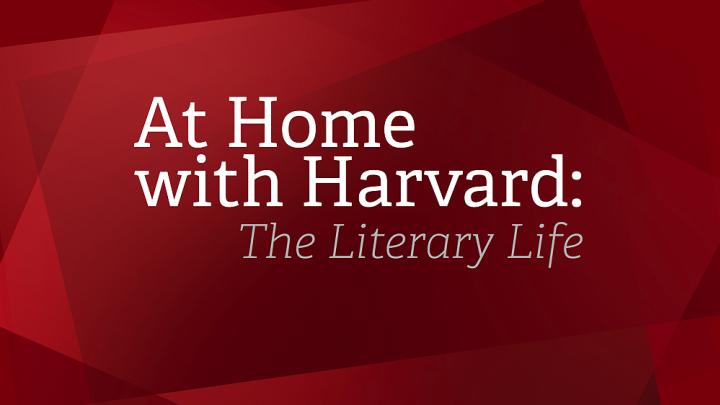This is the third installment in Harvard Magazine’s new series, “At Home with Harvard,” a guide to what to read, watch, and listen to while social distancing. Read the first two pieces, featuring stories about Harvard's Arnold Arboretum and Harvardians in film.
From alumni novelists, poets, and critics, to Harvard literary scholars and archivists, literature is one of Harvard Magazine's most-covered subjects. Here, our editors pick some of their favorite literary stories, from T.S. Eliot, a 1910 graduate of the College, to eminent contemporary authors like Colson Whitehead ’91 and Akhil Sharma, J.D. ’98. Scroll to the bottom for our staff members’ book recommendations, from Harvard authors and beyond.
Poetry
A few years ago, former Harvard Magazine editor Sophia Nguyen wrote about the Dark Room Collective, an African-American writers’ group and reading series co-founded by Harvard undergraduates. It’s one of my favorite magazine stories: richly detailed, thoughtfully narrated, full of poignant and revelatory anecdotes. The Dark Room Collective lasted only a decade—from 1988 to 1998—but, as Sophia writes, it shook up the “lily white” literary scene in Boston and beyond, and its influence remains enormous. Participants have won Pulitzer Prizes and National Book Awards and been chosen as U.S. poet laureates, and the group’s ranks include some of the best-known contemporary poets: Kevin Young ’92, Tracy K. Smith ’94, Carl Phillips ’81. Toward the end of the story, poet Major Jackson, RI ’07, sums up: “Each generation triggers the next generation into song and lyric.” Beautiful.
And after you’ve finished reading, explore the Woodberry Poetry Room’s online Listening Booth, which gathers digitized recordings, some now nearly a century old, from poets who have read their work at Harvard. The online highlights represent only a fraction of the full collection normally available to listeners in person at Lamont Library, but it is still immense. You can hear Elizabeth Bishop reading “The Fish,” and “Crusoe in England,” and “In the Waiting Room”; W.H. Auden reading “The Shield of Achilles” and “The Fall of Rome”; Yusef Komunyakaa reading “Facing It,” “My Father’s Love Letters,” and “Believing in Iron.” There are recordings of Robert Frost, Wallace Stevens, Dylan Thomas, William Carlos Williams, Derek Walcott, Audre Lorde. In a 1982 reading (one of three from him in the archive), the late Harvard professor and Nobel laureate Seamus Heaney (brilliantly profiled here) reads “Song,” a poem he playfully calls “a little fragment,” which ends with this stanza:
There are the mud-flowers of dialect
And the immortelles of perfect pitch
And the moment when the bird sings very close
To the music of what happens.
E.E. Cummings Comes to Tea at Harvard
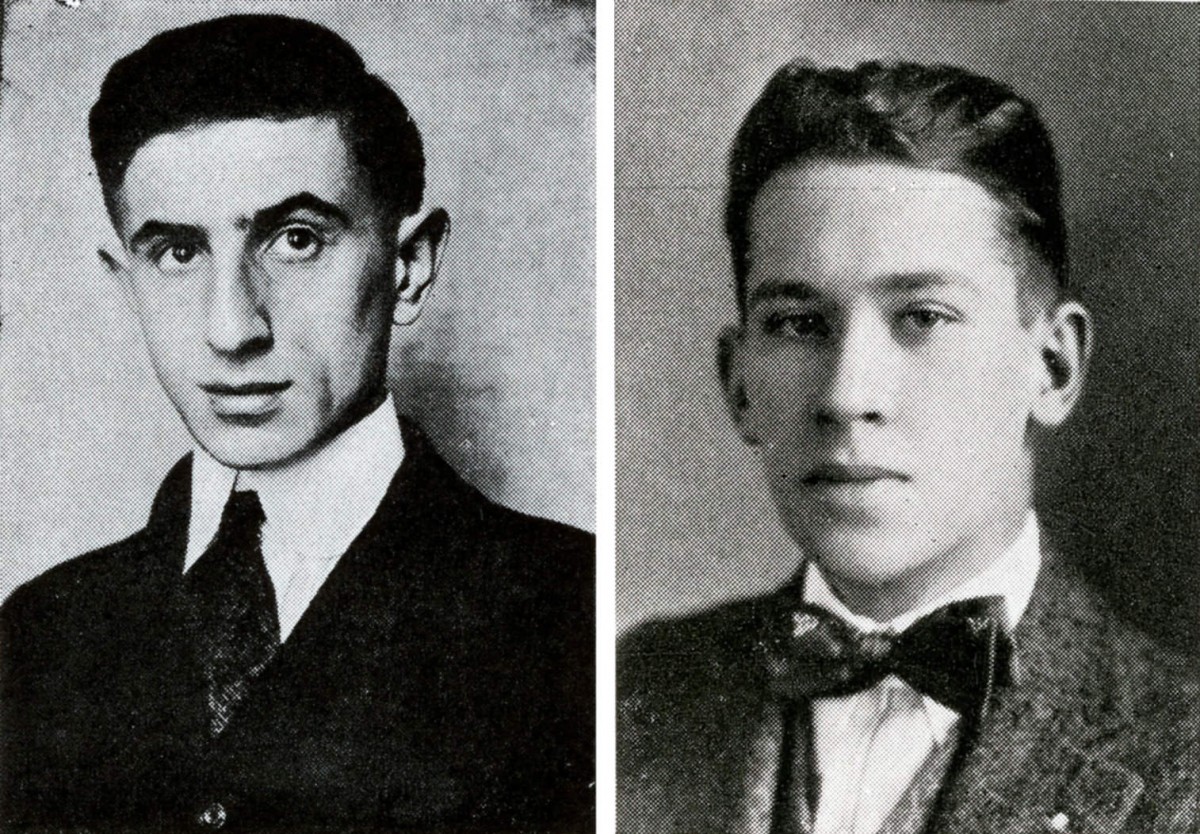
Fellow classics concentrators Sam Beck ’16 (left) and E.E. Cummings ’15
Alumni reminiscences are always a highlight for me—brief glimpses of campus that always feel both familiar and exotic. “Father and Son, and E.E. Cummings,” from a couple of years ago, recounting the time the poet E.E. Cummings came to tea at a freshman dorm, is perfectly delightful. James C. Beck ’56, M.D. ’63, conjures up a vivid scene: bearskin rug, borrowed tablecloth, gleaming tea set. It’s a sweet memory of a long-ago afternoon. It’s also a story about fathers and sons, migration and home, the joy of learning, and what can happen when you take a chance.
~Lydialyle Gibson, Associate Editor
T.S. Eliot Documents, Unearthed
“‘I think I didn’t fully understand that no one knew we had this document,’ says Leslie Morris, curator of the Houghton Library’s T.S. Eliot collection, describing the statement from the famous poet that was released just this month, a timebomb rigged to go off more than 50 years after his death.”
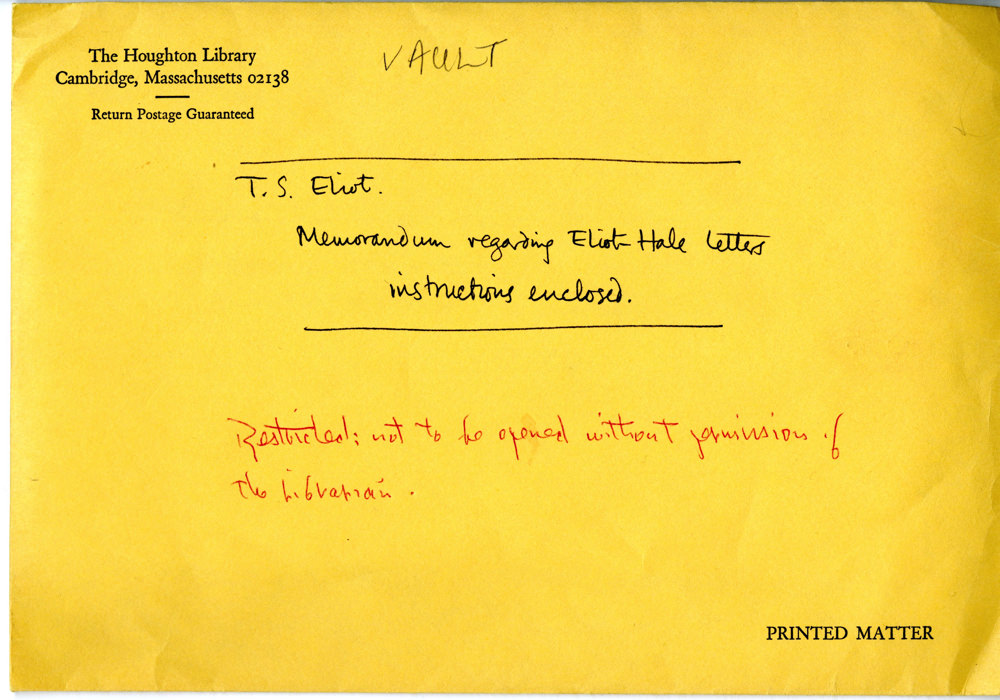
"I'd seen this thing sitting on a shelf in the vault for years," curator Leslie Morris says: the Houghton envelope containing a sealed envelope and instructions from T.S. Eliot.
Image courtesy of Houghton Library/Harvard University
This article written by my colleague Lydia Gibson is a juicy one, about T.S. Eliot’s relationship with Emily Hale. Hale donated Eliot’s 1,100 letters to her to Princeton. Eliot was so outraged that he wrote a rather bitter and contrasting account of their relationship; his documents were deposited in Harvard’s Houghton Library, where his other papers reside and were recently discovered.
Learn more about T.S. Eliot, A.B. 1910, A.M. ’11, Litt.D. ’47, in Adam Kirsch’s profile of the poet.

Rafael Campo
Photograph by Stu Rosner
In this difficult time, I found “The Physician-Poet” to be a refreshing story on empathy in medicine. We all need a little more empathy and compassion—toward ourselves and those who take care of us.
One of Harvard’s Most Popular Literature Classes
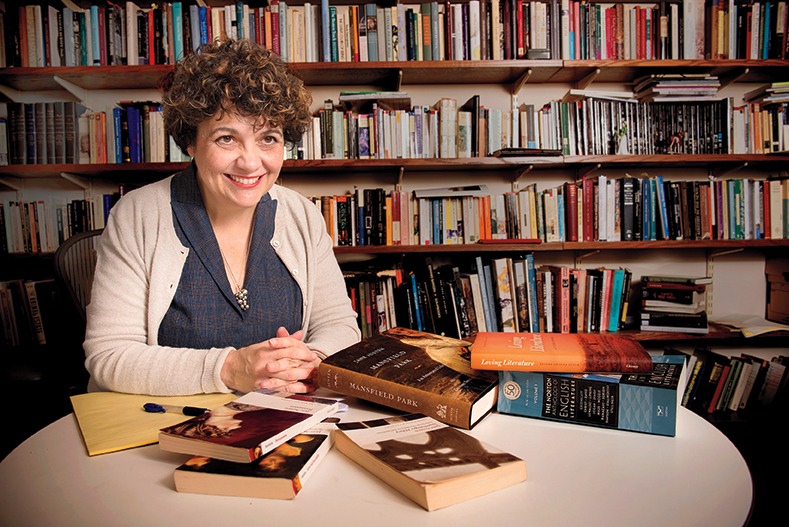
Deidre Lynch in her book-lined Barker Center office
Photograph by Stu Rosner
I was drawn to this article on Deidre Lynch’s “Jane Austen’s Fictions and Fans” course since I took a Jane Austen tutorial at the University of Oxford during my undergraduate years. “Janeites” are absolutely a thing, and I appreciate how Lynch’s class dives into the differences between Austen fans and Austen scholars. What does it mean to love literature, and should all readers feel the same? What is the value of an objective opinion? This article explores all these questions as well.
~Kristina DeMichele, Digital Content Strategist
Global Literature
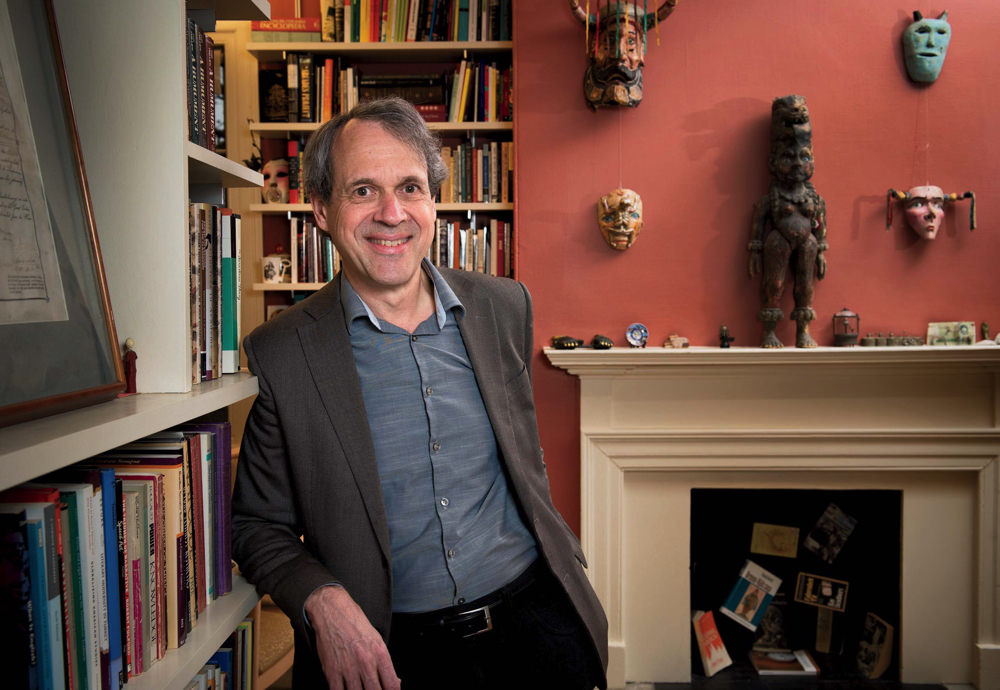
David Damrosch
Photograph by Stu Rosner
What is “world literature”? Its name, and your high-school literature classes, might create the impression that it’s “the study of any literature from anywhere, ever,” as contributing editor Spencer Lee Lenfield ’12 put it in “A World of Literature,” about Harvard’s leading comparative literature scholar David Damrosch. This smart, accessible, and thoroughly engaging feature explains: “World literature happens when Russian novels remake English literature; when a Turkish writer takes inspiration from a Colombian writer; when Japanese critics review translations of Lebanese poetry. It almost always involves re-interpretation and misunderstanding: a Spanish monk sent to suppress Aztec literature ended up disseminating it instead; subsequently, Aztec hymns envision a Christian God urging revolt against the Spaniards.” The world-literature movement’s origins might surprise you: “It didn’t come from elite graduate schools and percolate down, the way literary theory had,” Damrosch says. “It’s much more bottom-up—from K-12 schools and community colleges, because they’re having these influxes of people from around the world, and they wanted to reach them. So they started teaching world-literature courses.”
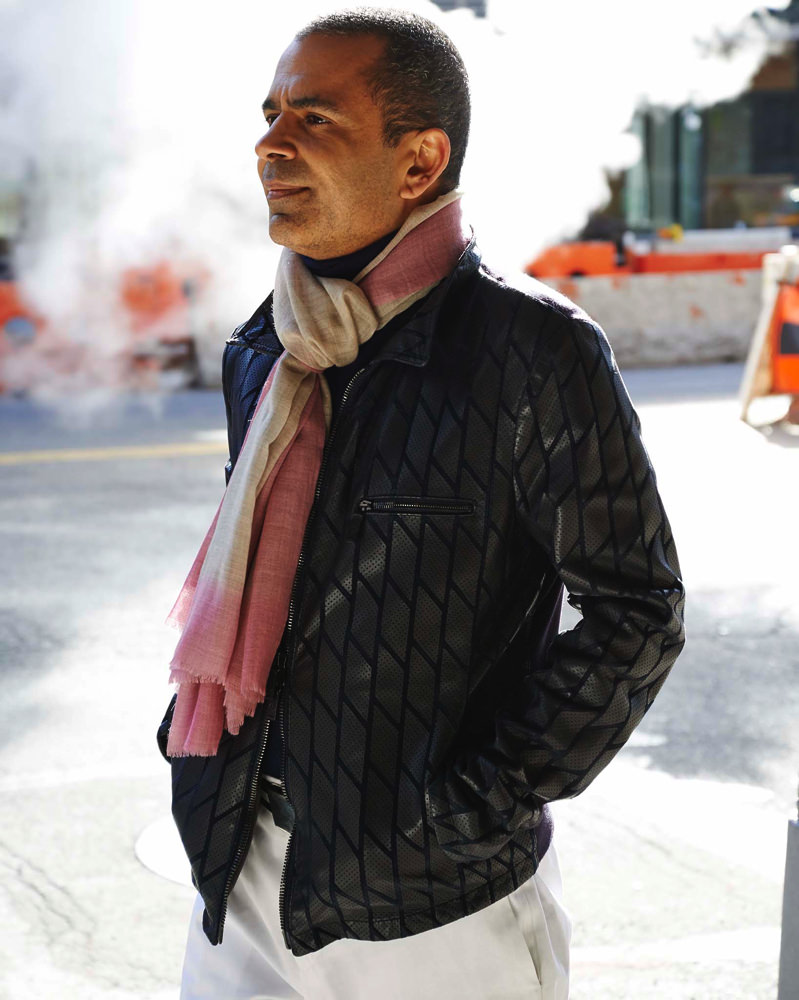
Akhil Sharma
Photograph by Nicholas Prakas
A few years ago, I got to talk to and write about my favorite author, Akhil Sharma, J.D. ’98, for the release of his short-story collection A Life of Adventure and Delight. Sharma is one of the most original storytellers of the immigrant experience working today (though, as he explains, he doesn’t like the idea of “immigration fiction”). His prose style is strikingly spare, yet deeply evocative; he has the language for emotions that usually elude comprehension. His celebrated autobiographical novel, Family Life, is highly recommended.
“A writer who stands squarely in our present dilemmas and confusions”
No Harvard writer list would be complete without Colson Whitehead ’91, author of the hugely successful Underground Railroad (2016) and, more recently, The Nickel Boys (2019). “In an era when commercial pressure reinforces the writerly instinct to cultivate a recognizable ‘voice,’ his astonishingly varied output, coupled with highly polished, virtuosic prose, makes Whitehead one of the most ambitious and unpredictable authors working today,” writes Jesse McCarthy, who is now assistant professor of English and of African and African American studies. Whitehead “is a writer who stands squarely in our present dilemmas and confusions, and suggests lines of sight no one else seems to have considered or dared to imagine.”
~Marina Bolotnikova, Associate Editor
Book Recommendations from Our Staff
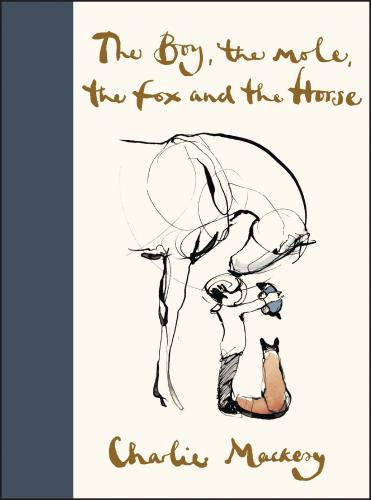
The Boy, The Mole, The Fox and The Horse by Charlie Mackesy. I actually got this book as a gift from Nancie at the Harvard Coop. It’s a children’s book but it has great nuggets of advice for everyone (kids and adults alike) and wonderful illustrations. Lately, I randomly open it to a page and read. It usually ends up being something I needed to see that particular day.
~ Gretchen Bostrom, Classifieds Manager
Parallel Lives: Five Victorian Marriages by Phyllis Rose ’64, Ph.D. ’70. Think of it as a book Jane Austen might have produced if she’d decided to write biographies instead of novels.
~Jean Martin, Senior Editor
The Inheritance of Loss by Kiran Desai. An amazing intergenerational novel about migration and the remnants of colonialism.
~Marina Bolotnikova, Associate Editor
The Power of Kindness: The Unexpected Benefits of Leading a Compassionate Life by Piero Ferrucci, and The Book of Self Care: Remedies for Healing the Mind, Body, and Soul by Mary Beth Janssen. Positive messages and acts are what we all need more of right now. Both are small books with big messages.
~Abby Shepard, Advertising Account Manager
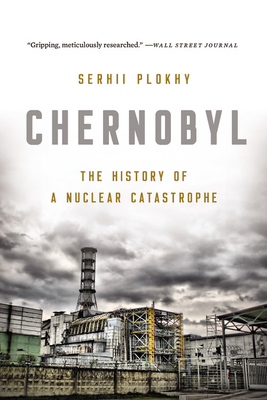
Chernobyl: The History of a Nuclear Catastrophe by Serhii Plokhy [usually spelled Plokhii], Mykhailo S. Hrushevs'kyi professor of Ukrainian history and director of the Harvard Ukrainian Research Institute. A vividly narrated, historically and archivally rich history of a man-made catastrophe, mishandled and disastrously covered up by a totalitarian state—which, come to think of it, may remind readers of a current disaster, the origins of which were mishandled…by an authoritarian state.
~ John Rosenberg, Editor
The King Must Die by Mary Renault. Renault is a historical novelist of the first order, and this book, which tells the story of young Theseus, king of Athens, is one of her best.
~Jon Shaw, Managing Editor
Thinking, Fast and Slow by Daniel Kahneman, LL.D. ’04. A great exploration and explanation on the mind’s two systems and how it directs our thoughts and decisions.
~Irving Buelto, Web/Technical Support Specialist
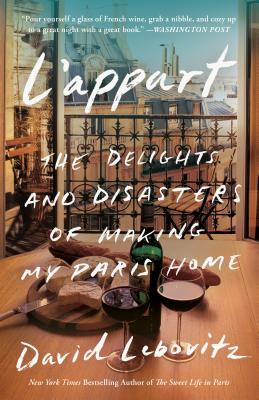
L’appart: The Delights and Disasters of Making My Paris Home by David Lebovitz. Have you ever dreamed about moving to Paris and having a pied-à-terre to call your own? L’appart, written by professional chef and author David Lebovitz, is a candid insider’s view of the complex process of finding, purchasing, and renovating a home in the City of Lights. Lebovitz takes you on his personal journey, through the joys and pitfalls he encounters along the way with sheer grit and determination to make things work at all costs.
~Allison Kern, Donor Relations and Stewardship Manager
Miracle in the Andes by Nano Parrado. A true story of a Uruguay Rugby team on a flight to Chile that crashes in the Andes and how many of them survived for 72 days. Really brings attention to what sacrifice and hardship look like.
~Bob Fitta, Director of Advertising
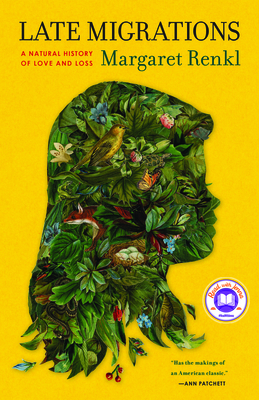
Late Migrations by Margaret Renkl. Brief, poignant essays from an Alabama-raised author living in Tennessee. Mixes recollections of family life—and love and loss—with acute observations on the natural world in her backyard. Sometimes funny and surprising, and compassionate throughout, with acute attention to the richness in every fleeting moment.
~Lydialyle Gibson, Associate Editor
